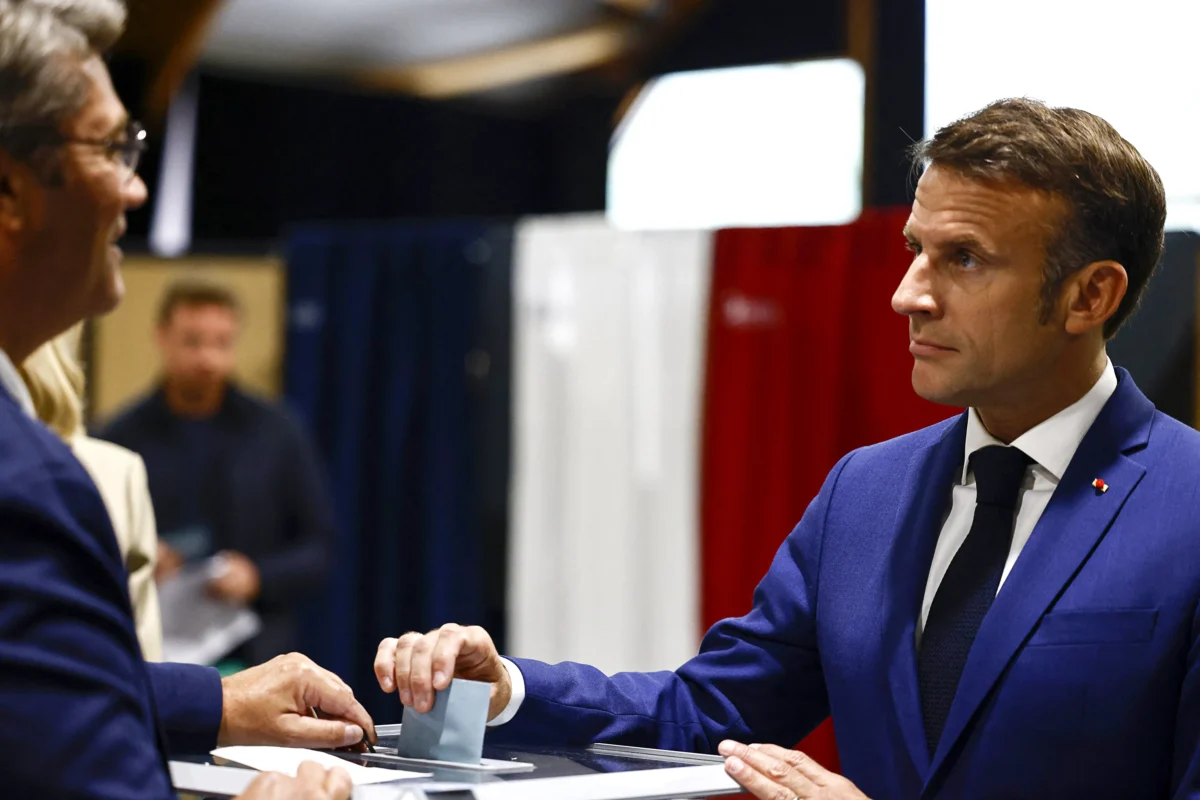The right-wing National Rally party is projected to win the largest share of the vote in France’s first round of parliamentary balloting on June 30.
Preliminary projections indicate that French President Emmanuel Macron’s party is on track for a devastating defeat in the National Assembly, where 577 seats are up for grabs. Early results show Mr. Macron’s party falling behind both the right-wing party and the left-wing coalition.
According to early exit polling by Ipsos, the National Rally Party—France’s leading right-wing populist party—is expected to win around 34 percent of the vote. The left-wing New Popular Front coalition is on track for second place, with around 28.1 percent.
Mr. Macron’s party, meanwhile, is expected to come third, with around 20.3 percent of the vote.
This election has drawn an unusually high turnout, with reports that around 60 percent of French voters participated, with a few hours still to go.
However, today’s results, should exit polls prove accurate, only represent the first round of voting. Races where a candidate failed to garner 50 percent or more of the vote will go to a runoff on July 7.
The results represent the largest right-wing victory in France since the end of World War II, and could represent a political earthquake for the French Republic should the National Rally expand their lead to a majority in the second round of balloting.
Some of those races will include up to three contenders.
Winning a parliamentary majority would enable National Rally president, Jordan Bardella, to become prime minister. Marine Le Pen inherited the party, then called the National Front, from her father, Jean-Marie Le Pen.
Addressing a jubilant crowd waving French tricolor flags of blue, white and red, Ms. Le Pen called on her supporters and voters who didn’t back her party in the first round to push it over the line and give it a commanding legislative majority. That scenario would force Mr. Bardella and Mr. Macron into a power-sharing arrangement. Mr. Macron has said he will not step down before his term expires in 2027.
Only the second round will make clear whether Ms. Le Pen’s party and its allies get the absolute majority they would need to comfortably form a government and then start to implement their promises to dismantle many of Mr. Macron’s key policies and foreign policy platforms. That would include stopping French deliveries of long-range missiles to Ukraine in the war against Russia’s full-scale invasion.
Centrist and left-wing parties, meanwhile, are anxious to take back the initiative from the National Rally party during the second round.
In both Mr. Macron’s camp and the left-wing camp, party and coalition leaders are calling for the third-place contender to pull out of the race to improve the chances of defeating the National Rally candidate.
Mr. Macron’s Renaissance Party announced that in races where their candidates came in third, they’ll have their candidate “withdraw in favor of candidates in a position to beat the National Rally and with whom we share what is essential: the values of the Republic.
“Faced with the threat of a victory for the extreme right, we call on all political groups to act responsibly and do the same.”
Les Républicains, another conservative party, is projected to take in around 10 percent of the vote. Currently, the party is indicating that it won’t issue endorsements for the second round.
“[In races] where our candidates aren’t present in the second round, considering that the voters are free to choose, we won’t give national instructions and will let the French people express themselves according to their conscience,” Les Républicains wrote in a statement.
The snap elections were ordered by Mr. Macron on June 9 following a rout of his party in the nation’s European Union parliamentary elections.
In that election, the National Rally came out with roughly the same margins, winning around 32 percent of the vote—margins so devastating for Mr. Macron that he decided to dissolve the National Assembly to pave the way for today’s elections.

With the second round still to come, it’s unclear whether the National Rally will ultimately win a majority.
Given its outsider status in French politics, the party would likely find it difficult to form a coalition government should they fall short of a majority of seats in the assembly.
Should the National Rally come out of the runoff with a majority, party leader Jordan Bardella would become prime minister of France.
In a statement after the results, Mr. Bardella vowed to be a unifying leader should the French people give his party an absolute majority. “I intend to be the prime minister of all French people, attentive to each and every one, respectful to the opposition, [and] concerned with national unity.”
Such an outcome—called “cohabitation” in the French model, representing a state of affairs where the prime minister and president share different political agendas—would be devastating for Mr. Macron, and would effectively guarantee that he would be stymied in his domestic agenda until his final term ends in 2027.
The Associated Press contributed to this report.
From The Epoch Times
